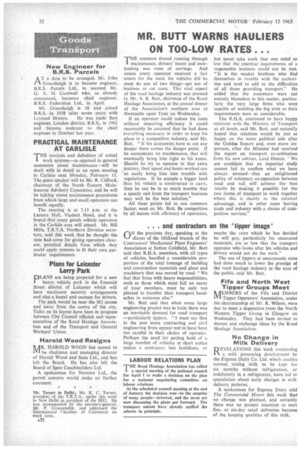MR. BUTT WARNS HAULIERS ON TOO-LOW RATES.
Page 34

If you've noticed an error in this article please click here to report it so we can fix it.
THE common thread running through maintenance, drivers' hours and overloading was rates of carriage. And unless every operator received a fair return for the work his vehicles did he must do one of two things—get out of business or cut costs. This vital aspect of the road haulage industry was stressed by Mr. A. R. Butt, chairman of the Road Haulage Association, at the annual dinner of the Association's northern area at Newcastle upon Tyne on Wednesday.
If an operator could reduce his costs without impairing efficiency it could reasonably be assumed that he had done everything necessary in order to keep his place in a competitive industry, said Mr. Butt. " If his economies have to cut any deeper there comes the danger point. If he economizes on maintenance, that will eventually bring him right to his knees. Should he try to squeeze in that extra journey, their speed and hours worked can 'so easily bring him into trouble with regulations. If he accepts a bigger load than his vehicle is constructed to carry, then he can be in so much trouble that a speedy exit from the transport business may well be the best solution."
All these points led to one common factor, went on Mr. Butt. Be competitive by all means with efficiency of operation,
but never take work that was rated so low that the essential requirements of a responsible business could not be met. "It is the weaker brethren who find themselves in trouble with the authorities and tend to add to the difficulties of all those providing transport." He added that the customers were not entirely blameless in this matter, particularly the very large firms who were capable of wielding the big stick as theft requirements were so considerable.
The R.H.A. continued to have happy relations with the Ministry of Transport at all levels, said Mr. Butt, and naturally hoped that relations would be just as happy on the more political side after the Geddes Report and, even more important, after the Minister had received the report on transport co-ordination from his new adviser, Lord Hinton. "We are confident that an impartial study cannot fail to confirm what we have always stressed—that an enlightened policy of voluntary co-operation between road and rail will achieve the best results by making it possible for the two forms of transport to work together where this isclearly to the national advantage, and in other cases leaving trade and industry with a choice of competitive services."






























































































































